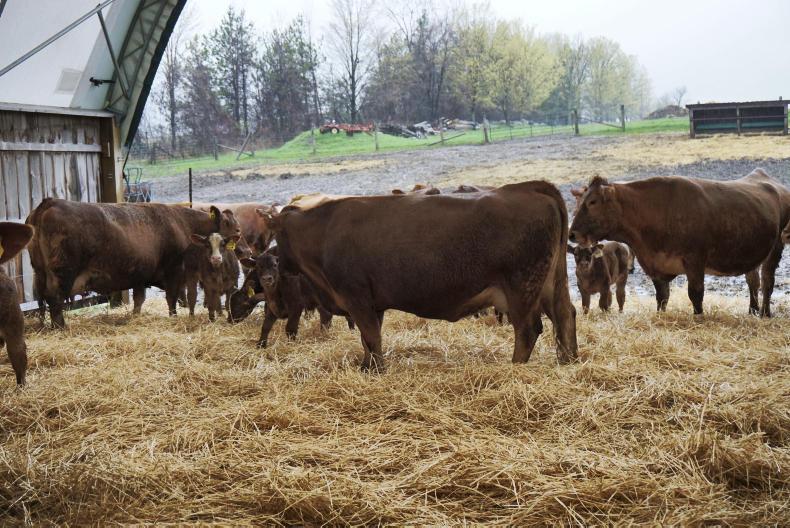While there has been considerable opposition to the EU granting 50,000t of a quota to Canada in the CETA trade deal, there is also protest at the Canadian end. Speaking to the Irish Farmers Journal, president of the Canadian Cattlemen’s Association (CCA) Dan Darling said that having the agreement was of no benefit unless there is “meaningful access”.
The issue doesn’t revolve around the fact that the EU has specified hormone-free beef. He said that this is what they signed up for and accepted the EU’s position on this. The Canadian issue is that factories using citric acid (what he describes as lemon and vinegar) are excluded from exporting to the EU, which effectively excludes two of the biggest traders in JBS and Cargill. He is adamant that what the EU is asking for is that factories in Canada lower their production standards across all production if some of the product is intended for the EU market.
Listen to an interview with Dan Darling in our podcast below:
Listen to "Dan Darling STINGS" on Spreaker.
The controversy around the use of carcase wash acid of whatever form lies in the fact that it isn’t accepted in the EU. The reason for its use is to (in as far as possible) eliminate all types of E coli, whereas in the EU focus is on carcase dressing to minimise any contamination accompanied by cooking advice on any meat product whose surface is exposed.
It is a prevention (EU position) versus intervention (Canadian and US position) debate, with the EU adopting the position that it will only accept imported product that conforms with EU productions systems. The Canadians are strongly of the view that this is a technical barrier.
While the Cattlemen’s Association are confined to beef cattle, he also highlighted the difficulty Canadian dairy producers have with EU access widened while Canadian production remains constrained by quotas.
Moving away from CETA, the other trade deal that has been occupying the Cattlemen’s president recently is the collapse by the USA of the Trans-Pacific Partnership (TPP) deal. This would have involved several Asian countries as well as Australia, New Zealand, Canada and Chile. However, with the new US President disapproving, the deal fell through despite President Obama agreeing it. Now the focus is on the other countries excluding the US seeing if they can put together an agreement between themselves and Dan Darling sees this as having greater potential than business with Europe in the near future.
Even if what he considers technical issues are resolved, the EU average cattle price lags behind Canada at present and therefore is unattractive from a market perspective as well. He did add that an exporting country can never have too many options in terms of market access.
There is reasonable satisfaction among Canadian farmers with factory prices at present even though they are well down on the highs of two years ago. Farmer frustration in Canada is greater with the big supermarket chains than it is with the factories. The supermarkets are seen as the ones squeezing their factory suppliers and this gets passed on to farmers.
Red tape and regulation, particularly on transport, is something that Canadian farmers would share with their Irish counterparts. There is also a vocal anti-meat lobby in Canada and one of the roles the association takes on is to challenge the anti-meat lobby through proactively demonstrating Canadian production standards.
The issue of an ageing farming population is a concern with the CCA president just as it is in Ireland and in fact is something that is regularly referenced by the commissioner as a priority in the next CAP reform.
Comment
The trade deal with Canada in CETA which gives Canadian exporters access to the EU for an extra 50,000t of beef has been strongly opposed by the farm organisations and several MEPs. The simple analysis is that the EU cannot accommodate this extra beef in a stagnant market for consumption and limited increase in EU exports.
Yet the Canadian analysis is equally critical because they consider the carcase washing issue as a non-tariff barrier. In fact, they go further and suggest that it is Canada, by accepting beef from the EU, that is accepting beef produced to the lower standard because it requires cooking to prevent E coli-induced illness unlike its Canadian counterpart.
This is unlikely to have much impact on EU thinking because they have strong views of EU consumers’ expectations on production and, as the WTO case with the USA demonstrated, even a WTO ruling didn’t have any effect on changing EU policy.
What has to be of real concern for Irish farmers is the fact that Europe is now matched or bettered by other export markets that can be supplied with both hormone- and acid-treated beef. What chance has Irish beef, produced to more restrictive standards that aren’t valued in the marketplace, of competing in wider global markets?






 This is a subscriber-only article
This is a subscriber-only article













SHARING OPTIONS: